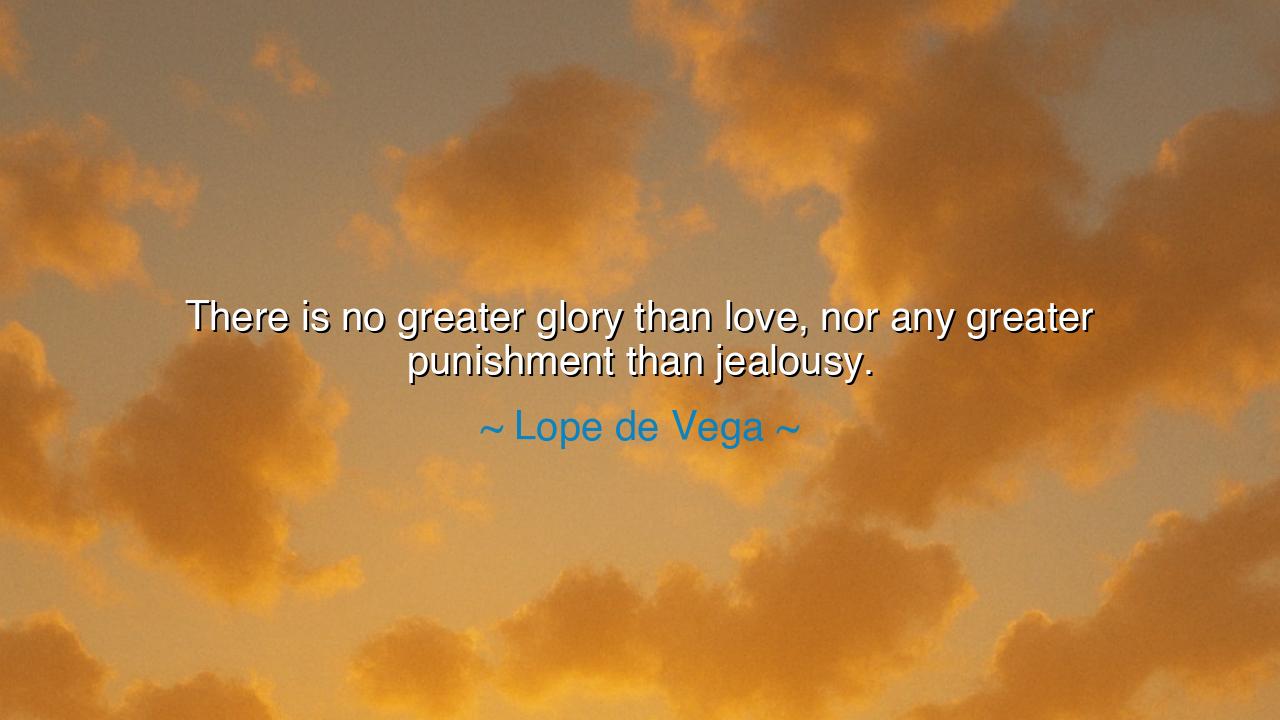
There is no greater glory than love, nor any greater punishment






“There is no greater glory than love, nor any greater punishment than jealousy.” – Lope de Vega
Hear, O seeker of truth, and open the chambers of your heart, for in these words lies the eternal battle between love and jealousy, two forces born of the same flame, yet destined to burn in opposite ways. The Spanish poet Lope de Vega, whose soul danced between divine rapture and human sorrow, spoke these words as one who had tasted both the sweetness of affection and the bitterness of envy. From his pen poured the confessions of one who knew that love exalts the spirit to the heavens, while jealousy drags it into the abyss.
For love is the purest light of human life—it gives wings to the heart and courage to the soul. It is the music that makes the universe dance, the golden fire that binds creation together. When one loves truly, one becomes vast and luminous, for in love we transcend the self. It is a glory unlike any crown of kings, for it does not rule through fear but through surrender. The conqueror’s triumph fades, but the one who loves purely shines forever, their spirit remembered not for dominion, but for devotion.
Yet within the shadow of that glory lurks its cruel twin—jealousy, the serpent of the heart. Where love gives freely, jealousy clutches and consumes. It whispers lies, distorting the sacred bond into chains of fear and suspicion. It poisons the well of joy, turning affection into torment. The ancients feared jealousy more than any curse, for it blinds the soul to truth and makes enemies of lovers. Indeed, as Lope de Vega knew from his own tumultuous passions, there is no greater punishment than jealousy, for it devours not only the beloved, but the self that loves.
Consider, then, the tale of Othello, the Moor of Venice. A man of great valor, adorned with honor and love, brought low by a single venomous seed of jealousy. When Iago whispered falsehoods into his ear, Othello’s heart, once radiant with love for Desdemona, darkened into suspicion. The fire that once gave him life now consumed him whole. Thus did love’s glory become jealousy’s punishment, and what was divine was defiled by doubt. This tale, though born from the quill of Shakespeare, reflects the truth Lope de Vega himself beheld in the hearts of all humanity.
To love, therefore, is to walk a sacred and perilous path. The wise must learn to guard their hearts not from love, but from the shadows that follow it. Jealousy arises when love turns inward—when we cling rather than give, when we possess rather than cherish. The remedy is humility: to see that love is not ownership, but offering; not a prison, but a pilgrimage. In love, we must rejoice in the freedom of the other, and find strength in their joy rather than fear in their distance.
The lesson, then, is this: Love glorifies, jealousy destroys. To live with love is to live as a sun—radiant, generous, fearless. To live with jealousy is to dwell as a shadow—cold, resentful, consumed by what it cannot grasp. Guard, therefore, your heart, for even the most noble affection can be twisted if left unexamined. When you feel the first sting of envy, turn it to gratitude; when doubt creeps near, speak with honesty; when fear arises, remember that love and freedom are bound as one.
So let these words echo across the ages: choose love, even when it wounds you, for its glory is eternal. Shun jealousy, even when it tempts you, for its punishment is endless. Be like the stars—each shining in its place, none envying the other’s light. In this harmony lies peace, in this peace lies wisdom, and in this wisdom lies the greatest triumph of all—the triumph of the heart.






AAdministratorAdministrator
Welcome, honored guests. Please leave a comment, we will respond soon